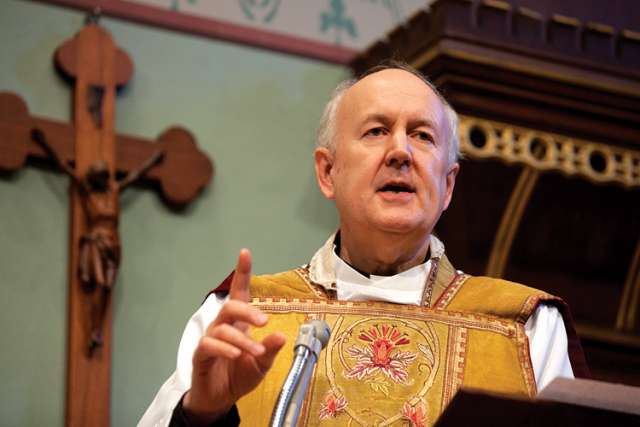“I really am encouraging priests, deacons, liturgical preachers to take time,” said Fr. Joseph Mele, author of The Sacred Conversation: The Art of Catholic Preaching and the New Evangelization. “What I always try to have my students do in preparing the homily is to first of all spend time simply reading the word, reading the Scripture, studying it ... and let the word speak to them. You really need to take time to outline, to structure your homily so that you know one main point and you are going to be concise about that.”
And that main point cannot be a message from the preacher himself to the people in the pews but rather one which comes from God. Recognizing this is one of the biggest challenges young preachers struggle with, said Mele, who holds a PhD in rhetoric and communications from Duquesne University in Pittsburgh.
That’s because hearing the message from God requires patience and a willingness to put one’s own agenda aside.
“Often the first thing to come to mind is still their own thought — this is what I want to say about this passage,” said Mele, a former professor of homiletics at Saint Vincent College in Pennsylvania. “Nine times out of 10 if they just stay patient and prayerful and reflective on the word another message will come. So the priest really needs to be faithful to wait for God to communicate the message God is desiring for the people.”
Mele gave this message to the Archdiocese of Toronto’s conference in homiletics held July 7 to 10 at St. Augustine’s Seminary. The conference, part of the seminary’s centenary celebrations, aimed to improve the preaching power of the archdiocese’s priests and deacons at the request of Cardinal Thomas Collins.
“(The cardinal) wanted to put a special emphasis on improving the state of homiletics,” said Deacon Peter Lovrick, who organized the three-day event. “Every one of the last popes have talked about the urgency to improve the state of homiletics in the Church and have given some very poignant and specific challenges or calls to the Church’s preachers as kind of a vocation for us to live up to. The Church is being very clear in what it is asking for from its preachers.”
Lovrick, a professor of homiletics at St. Augustine’s, said what the Vatican desires is preaching rooted in and focusing on Scripture. By doing that Lovrick said preachers will avoid the challenges Mele spoke of.
“If you do what the Church is asking you to do then you avoid all of the problems,” said Lovrick. “The problems being making preaching your own hobby horse, implementing your own agenda, bringing your own political slants in. It is almost an abuse of the congregation when you have a captive audience and they’ve come to hear the mind of the Church and not to hear your own particular agenda.
“Keeping focus on the Scripture, keeping focus on the mind of the Church, helps one keep focus on what the Church is asking for.”
Where Lovrick and Mele had a differed was on the length of the homily. For Lovrick, ideally a preacher will stay at the pulpit for 10 to 12 minutes while his American peer prefers a briefer seven- to eight-minute homily.
But at the end of the day, quality trumps quantity for both.
“I don’t like particularly to be emphasizing time limits,” said Lovrick. “It seems to me for a bad preacher five minutes can seem terribly long and for a wonderful preacher 20 minutes may just fly by like nothing. (A good homily) is an act of worship, an act of praise and an act of love which echos and fully connects with everything else.”


